By clicking a retailer link you consent to third-party cookies that track your onward journey. This enables W? to receive an affiliate commission if you make a purchase, which supports our mission to be the UK's consumer champion.
How to buy the best home office desk

Choosing the right office desk for your space is essential for maximum comfort and productivity. But with so many styles and features to consider, it can be hard to know where to start.
In our expert guide, we run through the best desks for working from home, including standing desks, folding desks and wall-mounted desks. Plus, we take a look at how much desks cost, where to buy them and top tips for healthy desk working.
Below, you'll find details on how to choose your desk wisely, along with product recommendations from several big-name retailers including Ikea, John Lewis and Wayfair.
Work comfortably from home – choose one of our best office chairs and the best walking pads and under-desk treadmills.
Key considerations for choosing your home office desk
1. How big is the desk?
A standard two-drawer desk will measure around a metre wide. If you're tucking yourself into the corner of a room or in a gap beneath stairs, a one-drawer desk might be a better fit. If you're short on space, a laptop stand could be an even better option (more on this below).
As well as noting the more obvious dimensions of your room and the measurements of the desk before you buy online, also check whether the office chair you use will fit underneath it.
Typically, a home office desk is around 73-76cm high. Some home office desks have feet that can be raised slightly if needed.
2. Does the desk offer storage space?
If your home office has no room for additional storage, consider a desk with built-in drawers.
To add storage space to a desk you already own, buy a monitor stand with built-in drawers. You can also tuck paper and storage baskets underneath a laptop stand.
3. Does the desk have a cable hole tidy (desk grommet)?
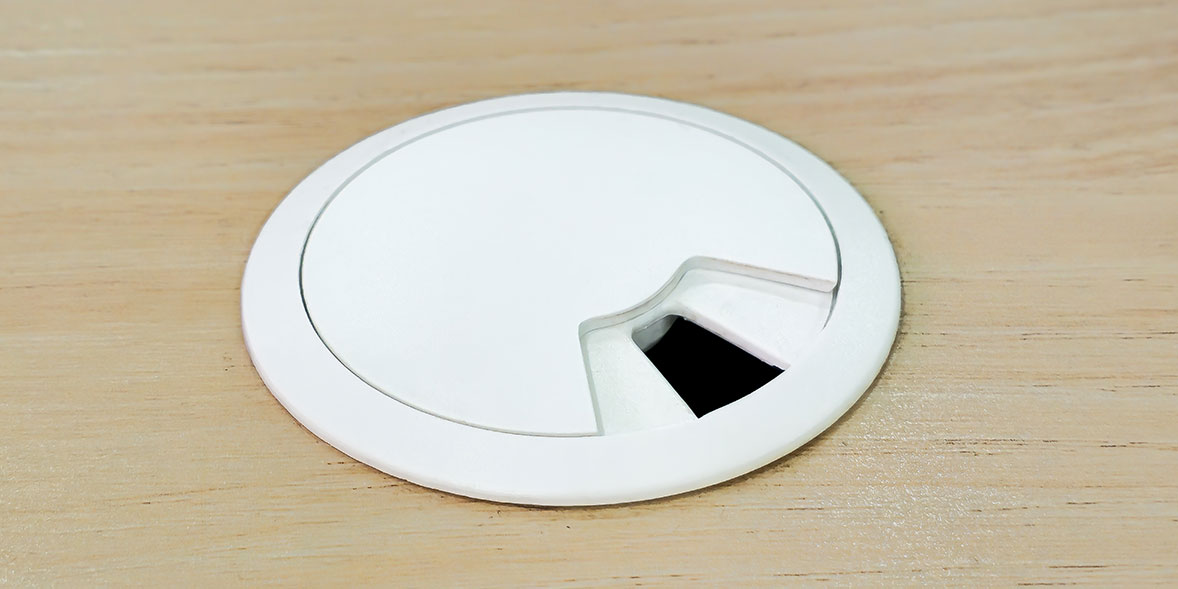
A desk with a built-in cable tidy will help you keep wires from your computer, keyboard and mouse neatly threaded through a hole at the corner of the desk, leaving you more room for a notepad and other essentials.
If you're shopping on a budget, the desk you're looking at might not have built-in cable storage, but you can buy a clamp-style cable tidy to attach to the side of the desk instead. These typically cost £10 or less online.
4. Does the desk promote a healthy posture?
Advice from the NHS suggests adjusting your chair so your lower back is properly supported, as this will help reduce the risk of back pain. Your knees should be slightly lower than your hips (use a footrest if necessary), and your forearms should be straight and level with the floor.
Your screen should be an arm’s length in front of you, with the top of the screen level at eye level or just slightly below.
A mouse mat with a wrist pad can help you keep your wrist straight.
5. What is the desk made from?
The majority of looks-like-wood desks are made from laminated particle board or MDF – or sometimes a wood frame with MDF drawers and top.
MDF is generally quite strong, affordable and comes in a multitude of finishes. It has a very smooth surface, which means you can paint it a different colour if you decide to redecorate your home office.
You'll pay considerably more for a desk finished with real wood veneers or a desk made from solid wood.
Metal desks are often made with a steel frame, with fittings of brass or copper popping up. They're also fireproof and waterproof, but watch out for rough edges that could scratch wood floors – you might want to invest in some table feet.
See below for examples of MDF, real wood veneer and metal desks:
Small home office desks
The desk you choose will largely depend on your room's layout.
A corner desk offers plenty of room to spread out if you have space. But for a smaller home or shared accommodation, you might need to squeeze in a portable desk on wheels or a laptop stand that you can rest on the kitchen table.
Wall-mounted desk
Typical spend: £50-£150

A wall-mounted desk is usually kept in place by brackets. Some models just 'float' in place and have nothing underneath, while others have legs to offer extra support.
If you want to clear some space when you're done with work, you can pick a wall-mounted desk that folds down when not being used.
Folding desk
Typical spend: £40-£100
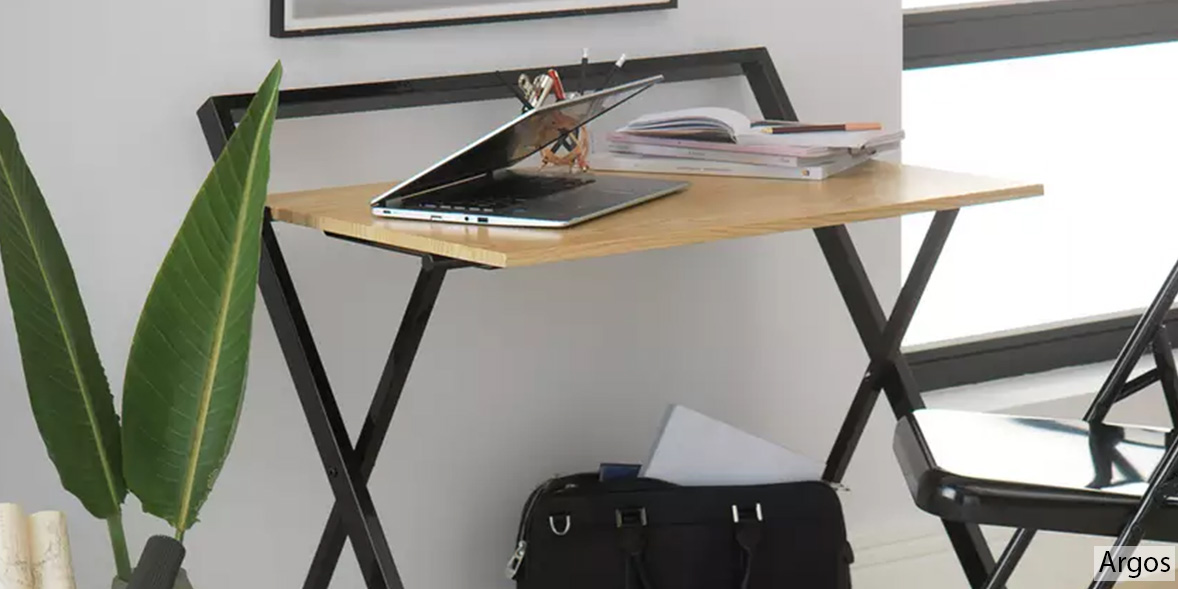
This is a sensible choice if you're short on space and want a workstation that can be packed away. Most folding desks feature collapsible metal or wooden legs, allowing you to store the desk behind a door or in a cupboard.
You won't likely get the same sturdiness as you would with a fixed desk, but the portability of a folding desk makes it well-suited to flexible working.
Desk on wheels
Typical spend: £50-£150

Lots of online retailers stock portable workspaces on wheels that you can move around. Wayfair is a good place to start, selling a range of wheel-equipped desks that, in some cases, are even big enough to hold a printer.
Laptop stand
Typical spend: £20-£40
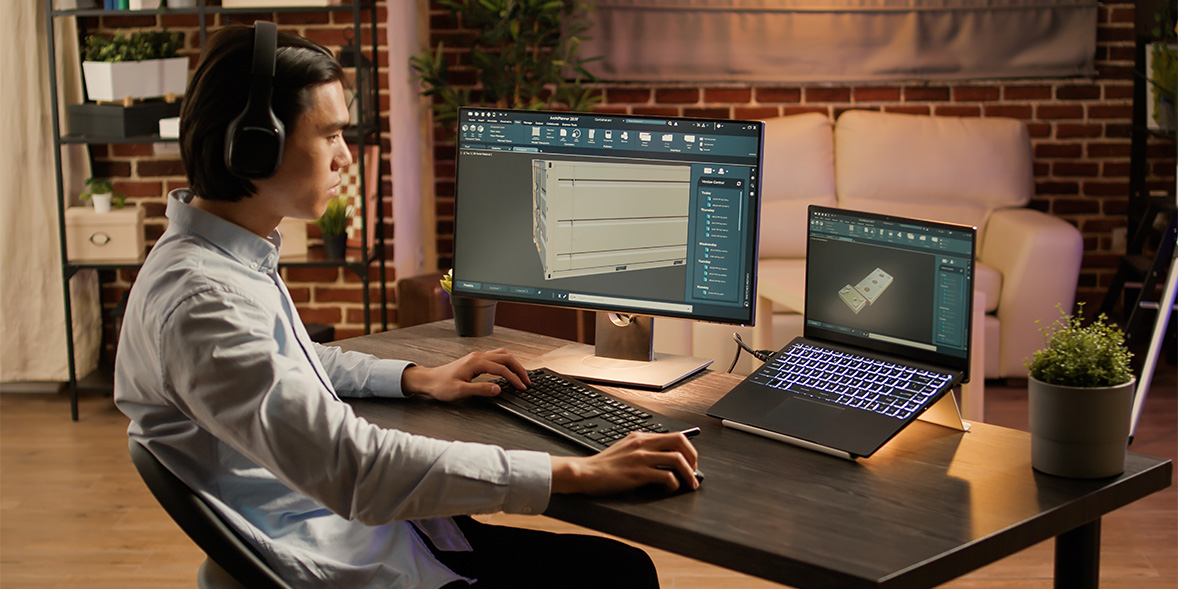
This is a good option if you don't want to buy a new table for your home office setup. Using a laptop stand can also work wonders for your posture, preventing you from hunching over while scrolling through emails.
Most laptop stands are made of metal, but we've seen some plastic alternatives on Amazon. Plastic is more likely to bend under the weight of a chunky laptop, though, so be careful.
Bed/sofa tray desk
Typical spend: £20-£40
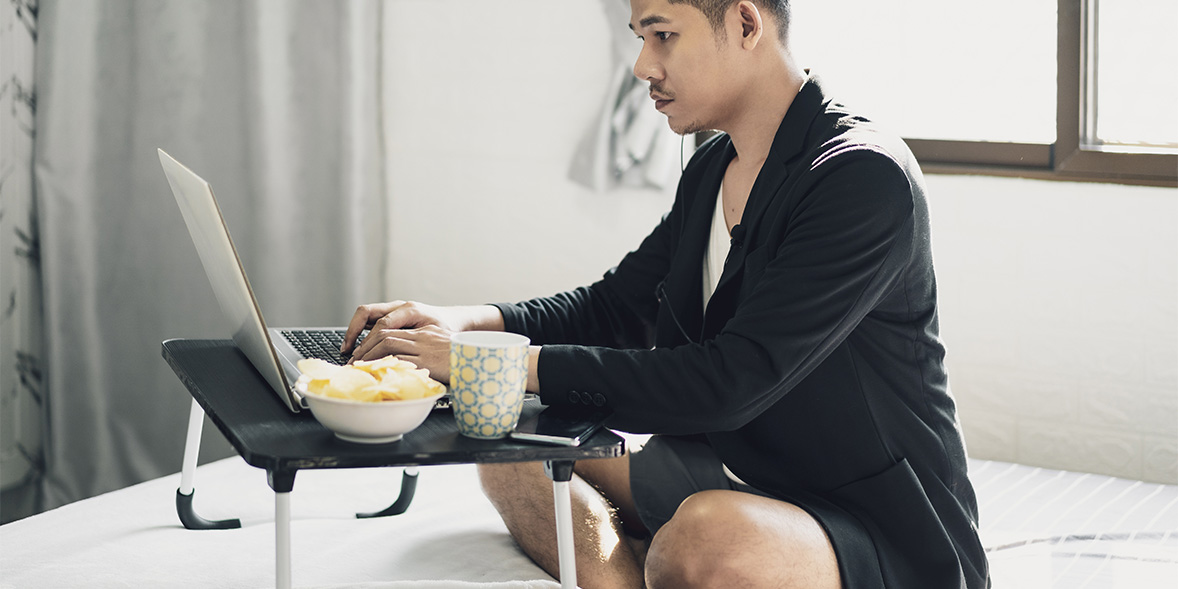
A sofa desk works in the same way a dinner tray does. It's a flat, lightweight platform on legs, so you can sit or lie down on the sofa or bed and use your laptop without it sliding around all over the place. Most sofa tray desks come with textured feet that offer some extra stability.
Computer desk
Typical spend: £100-£200

These are built to withstand the weight of a laptop or PC monitor.
Many computer desks arrive with a roll-out tray for a computer keyboard, along with shelving that's big enough to accommodate a home office printer or PC tower.
Corner desk (L-shaped desk)
Typical spend: £150-£200

Investing in a corner desk (also known as a L-shaped desk) could be a wise move if you're dealing with an awkward room shape.
Corner desks are usually pricier than common, rectangular desks, but on the plus side you get a space-saving design and room for storing your work documents.
Standing desk (sit/stand desk)
Typical spend: £150-£200 (manual)/£250+ (electric)

If you like the idea of working on your feet once in a while, a sit/stand desk is the way to go. These shape-shifting desks encourage a healthier working from home routine, improving circulation in your legs and reducing lower back pain.
You'll save some money if you opt for a manual sit/stand desk. These are usually operated by a crank system that lets you decide exactly how tall you want the desk.
If you've got the budget for it, an electric sit/stand desk is even more convenient, transforming at the touch of a button.
Treadmill desk
Typical spend: from £1,000 (fits under your existing standing desk) to £3,000 (includes both treadmill and desk)

Treadmill desks are the next step up from sit/stand desks in the 'healthy desk' stakes. They're made up of a treadmill that sits underneath an attached standing desk – this lets you exercise while you work. Alternatively, you can buy a treadmill that goes underneath your existing sit/stand desk.
A treadmill desk could be a good fit if you think you can still focus on your job while walking. Combining the two is akin to patting your head while rubbing your stomach: it can take a while to master.
You can also lose weight with a treadmill desk if you walk far enough, although you can't run. As a result, you obviously won't burn off quite as much as you would on the treadmill at the gym.
For more options, see our guide to the best walking pads and under-desk treadmills.
Heated desk
Typical spend: £500-£800

The majority of heated desks work through infrared heating built into the underside of the flat top surface. Infrared is typically thought of as a more economical form of heating, as it heats objects rather than the air (like a fan heater), so less heat is wasted. The heat is usually directed straight down underneath the desk to warm your legs and feet.
These types of desks are some of the priciest on the market, with the most expensive models costing around £1,000. There is an argument that despite the high upfront cost, a heated desk can save you money in the long run as you may not have to turn on your central heating as often. However, as we haven't tested this yet, we can't say for sure.
Heated desks can be static or sit/stand with temperature controls usually built into the desk.
Ikea desks
Typical spend: £20-£500
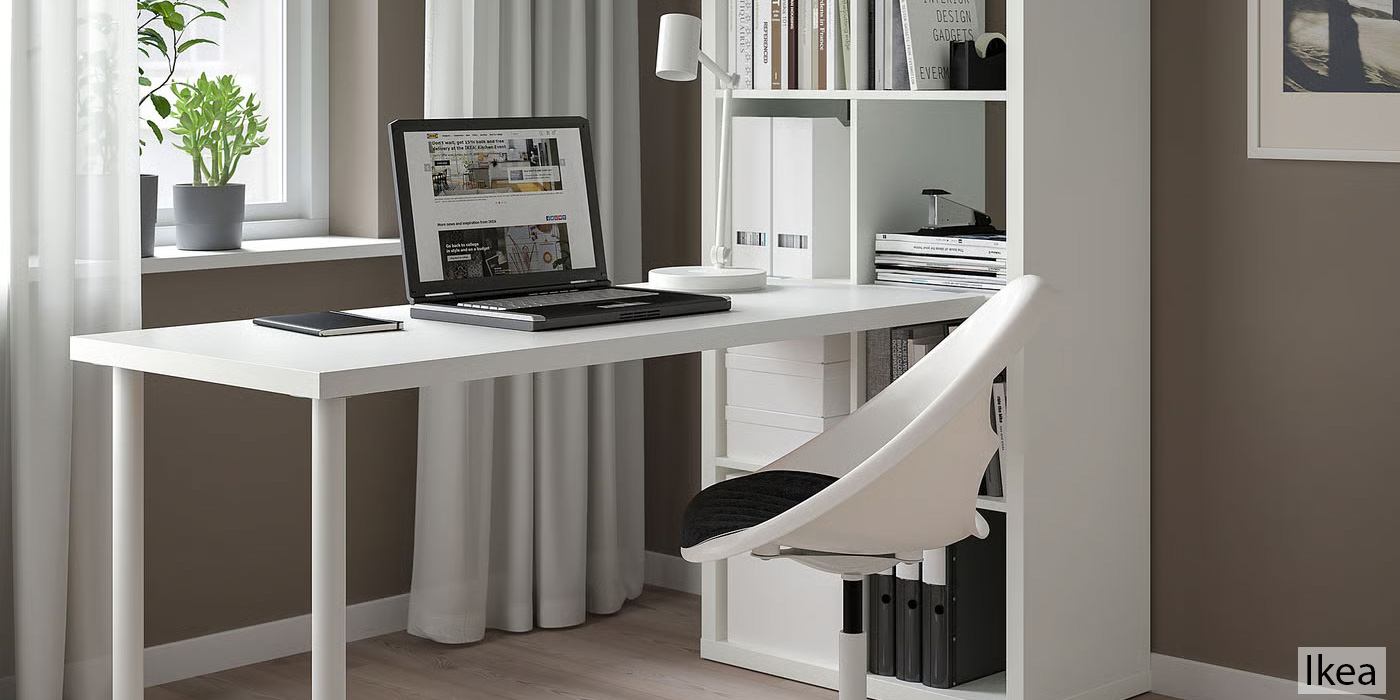
Ikea is a popular go-to for minimalist office furniture, offering a wide selection of desks to suit your space and budget. The range includes a mix of compact workstations, height-adjustable sit/stand desks and larger setups with built-in storage.
At the time of writing, Ikea's website lists the following desks among its most popular:
- Malm (£89) – a dressing table that would offer enough space for a laptop. It has a wide, felt-lined drawer.
- Lagkapten / Alex (£165) – available in a range of colours, this desk has two sets of drawers with five compartments each.
- Micke, 73x50 cm (£49) – a narrow, space-saving desk that comes in a black or white finish.
- Micke, 105x50 cm (£79) – the larger version of the Micke. You can mount the storage unit to the right or left, depending on your room layout.
- Linnmon / Adils (£25) – a very basic desk that might appeal if you're looking to keep costs down.
Where to buy a home office desk
When shopping for a home office desk, check the retailer's returns policy and pay attention to customer feedback and reviews.
Popular retailers stocking a selection of home office desks include:
- Amazon – thousands of home office desks for different room sizes.
- Argos – basic workstations and premium oak desks.
- Dunelm – a huge range of office desks, most of which offer built-in storage.
- eBay – offers lots of choice with the majority of the desks built from wood or MDF.
- Futon Company – sells ladder desks, mini desks, standing desks and more.
- Ikea – as outlined above, Ikea offers good choice of portable laptop stands and large computer desks.
- John Lewis – a selection of wood desks in different tones. You'll also spot lots of desk accessories for storing pens and paper.
See our rundown of the best and worst online shops, as voted for by thousands of shoppers.
